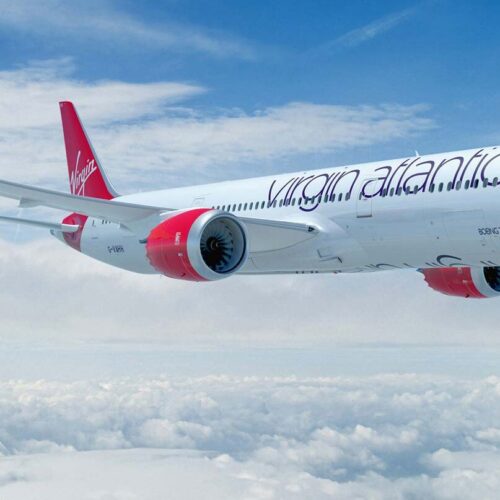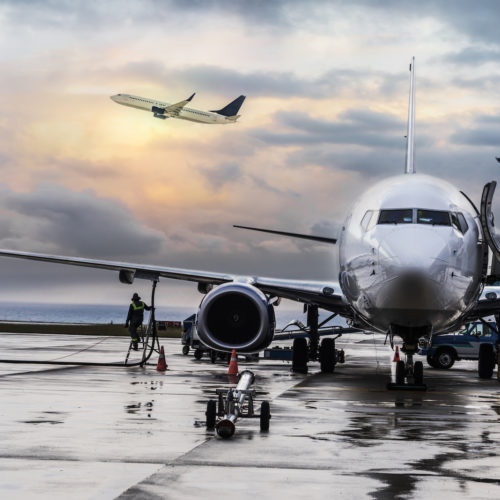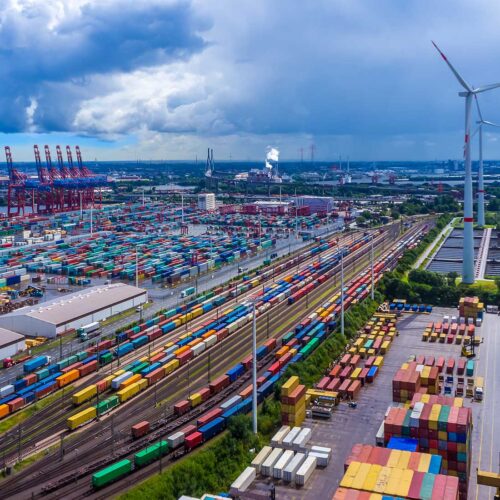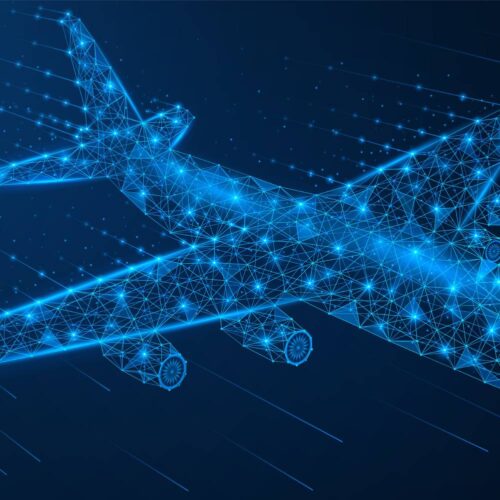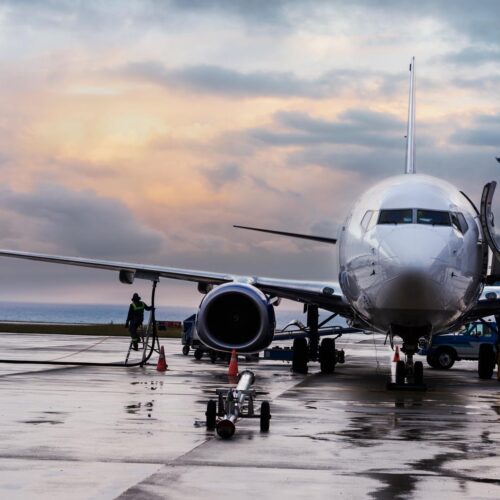Report

Decarbonizing Aviation
Net-Zero Aviation is Ready for Take-Off
The Challenge Overhead
For business or pleasure, domestically and internationally, society increasingly relies on the benefits and connectivity that air transport provides. In the United States, 90 percent of the population has taken a commercial flight in their lifetime. Additionally, air cargo transports over $6 trillion worth of goods — including critical supplies like life-saving medicines and aid — around the world each year. But like many transport sectors, all this flying has an unintended consequence: greenhouse gas emissions that warm our climate.
Nearly 2.5 percent of today’s carbon emissions are a result of global air travel — although emissions are expected to peak within this decade, aviation’s share of global emissions is projected to rise in coming years as other economic sectors decarbonize at a faster pace. The main culprit is the fossil fuel used to power aircraft. Even with exciting advancements in battery- and hydrogen-powered aircraft, today’s planes — and a large portion of the future aircraft fleet — are dependent on burning liquid fuels. Sustainable aviation fuel (SAF), often in the form of biofuel, has the potential to reduce the carbon intensity of flying by more than 80 percent and can be used in today’s aircraft. But SAF currently represents less than 0.1 percent of global aviation fuel due to insufficient supply, disaggregated demand, and cost barriers.
In addition, the industry faces the challenge of addressing the non-CO2 impacts of flying which are becoming increasingly understood as research in the area progresses. For example, contrail cirrus formations, the wispy white clouds trailing behind many aircraft, are now understood to have a significant warming impact, perhaps even more so than the CO2 emissions from air travel alone. Averaged over all flights based on a global warming potential (GWP) 100-year time period, contrails are estimated on a conservative basis to contribute a warming effect comparable to an additional 61 percent of annual aviation CO2 emissions. However, since contrails have short atmospheric lifespans relative to CO2, avoiding or reducing their formation may result in significant near-term reductions to climate warming attributable to aviation.
First-Class Solutions
In October of 2021, the International Air Transport Association (IATA) passed a resolution to fly net zero by 2050. That’s good news for the environment, because IATA represents around 300 airlines, or 83 percent of total air traffic. Many individual airlines, companies, and whole countries, have also pledged to drastically reduce their aviation emissions. The industry’s commitment to decarbonization means net-zero aviation is cleared for take-off, and it starts with scaling sustainable aviation fuel.
SAF, made from non-petroleum-based, renewable feedstocks, is the only scalable tool to decarbonize aviation right now. Biofuels are becoming more readily available as companies convert municipal solid waste, used cooking oil, agricultural waste, and other organic matter into fuel while promising new pathways to produce synthetic or ‘power to liquid fuels’ from renewable energy and captured CO2 continue to advance. But to keep the aviation sector on track for net zero in 2050, the SAF project pipeline will require massive capital investments. RMI is working closely with fuel suppliers, airlines, and corporate buyers to connect the dots across the value chain for sustainable aviation fuel in order to rapidly increase availability and use of this critical, low-emissions fuel.
We’re also working with the aviation industry to tackle the impact from contrails, which form at cruising altitude when the atmosphere has proper conditions for water to condense behind engine exhaust trails. What if aircraft avoided those conditions? In collaboration with airlines and researchers, we are helping develop tools so aviators can adjust flight plans to mitigate contrails, just like turbulence, icing, or inclement weather are incorporated into flight planning today. By establishing a playbook for contrail avoidance, we can help airlines significantly reduce the climate impacts of aviation in the near term.
By building relationships with fuel suppliers, airlines, airports, researchers, and corporate buyers, and providing them with the analysis and tools they need, RMI is addressing both air travel carbon emissions and the climate impact of aviation contrails.
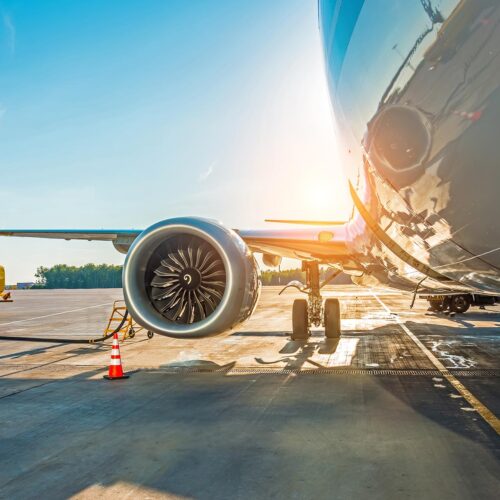
SABA
Spearheaded by RMI and Environmental Defense Fund (EDF), the Sustainable Aviation Buyers Alliance (SABA) is working to accelerate the path to net-zero air transport by driving investment in sustainable aviation fuel (SAF), catalyzing SAF production and technological innovation, and supporting member engagement in policymaking efforts.

SAFc Registry
Working with, EDF, SABA and Energy Web, we've launched a rigorous, transparent SAF certificate system to aggregate demand for SAF and help eliminate barriers to adoption. The system will expand SAF investment opportunities to all businesses, organizations, and even individuals interested in reducing the climate impacts of air transport. It will accelerate the use and bring down the costs of SAF, to help drive aviation emissions reductions at the scale and pace that the science demands.

SAF Supply
RMI's multifaceted support for SAF project developers includes technoeconomic analyses, policy insights, and assessments of SAF feedstock, technology, and economic viability through our work on Mission Possible Partnership’s clean industrial hubs.
Additionally, we have conducted research on specific geographic regions that have access to SAF feedstock, can host feedstock processing facilities, have robust transport networks, and are near demand centers, such as airports or have export capabilities to domestic and international markets.
Airplane Leaving Contrail

Contrail Impact Task Force
The RMI-led Contrail Impact Task Force (CITF) convenes stakeholders from across the aviation value chain including academic researchers, technology providers, airlines, OEMs, industry groups, and regulators with the goals of expanding upon the latest science on the climate impact of contrails, exploring and testing potentially actionable strategies to safely avoid warming contrails, identifying the operational and financial challenges of implementing potential solutions, and establishing a roadmap for implementation and validation of contrail mitigation tools.

Financing Aviation Decarbonization
The financial sector will play a crucial role in funding the technologies and projects needed to transition the aviation sector to net zero. RMI’s Center for Climate-Aligned Finance is working with top lenders to the aviation sector, industry groups, and companies to develop a climate-aligned framework. This framework will include an emissions intensity metric, a reference 1.5°C scenario-based benchmark, and technical resources to enable the sourcing of high-quality data that will enable financial institutions to understand their aviation lending portfolio and engage with their clients to help fund their decarbonization projects.
Article
Article
Press Release
Article
Article
Article
Press Release
Press Release
Article
Report
Article
Article



